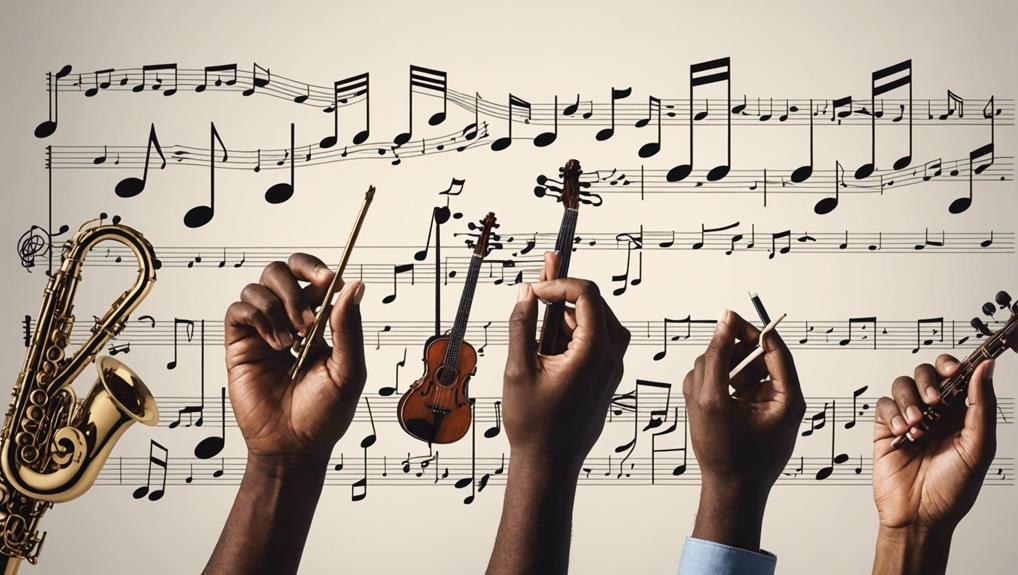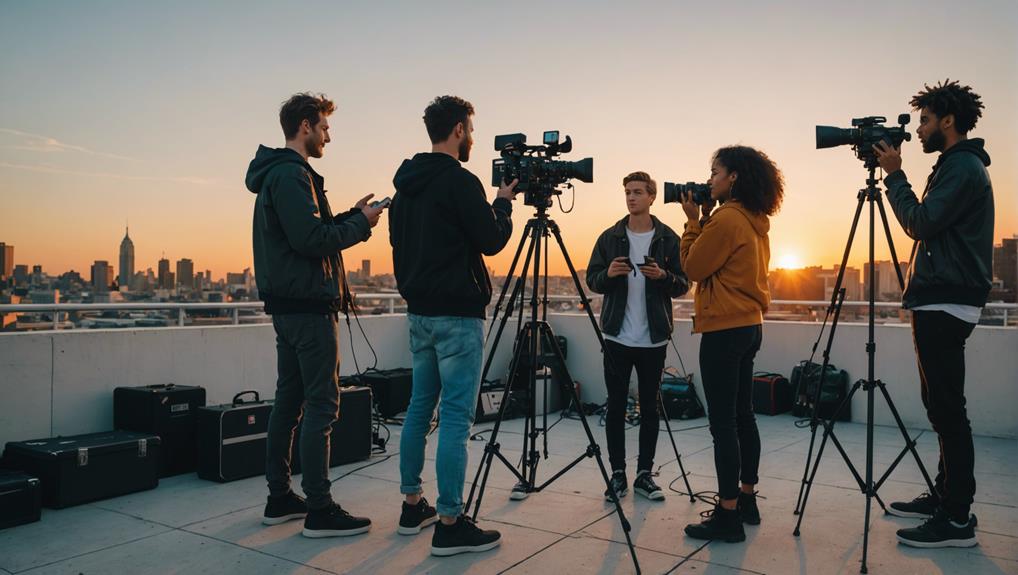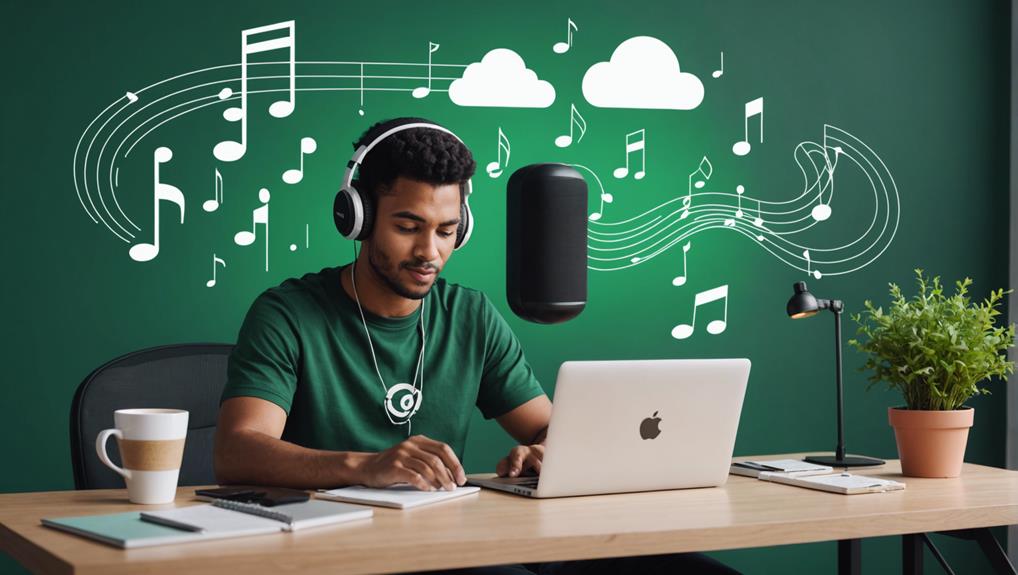No products in the cart.
To legally download free music in 2024, start by identifying trustworthy music sources like Free Music Archive, Jamendo, and SoundCloud. Register on these platforms to support artists and gain access to a broader library. Explore and stream free tracks to verify quality, focusing on different genres. Always check if the music is covered under a Creative Commons license or is in the public domain, understanding all usage terms. Download your chosen tracks from these authorized platforms, enjoying the music while respecting copyright laws. Following these steps not only guarantees legality but greatly expands your musical horizons.
Key Takeaways
- Register on trusted platforms like Bandcamp, Jamendo, and SoundCloud for legal and free music downloads.
- Search for tracks covered under Creative Commons licenses to ensure legality.
- Stream music on Free Music Archive to verify quality before downloading.
- Check for music in the public domain for unrestricted usage and downloads.
- Always verify the security of websites and ensure a secure connection before downloading tracks.
Identify Legal Music Sources
To legally download free music in 2024, you’ll want to identify platforms like Free Music Archive, Jamendo, SoundCloud, and Bandcamp, which all offer music legally provided by artists or under Creative Commons licenses. These platforms support independent artists, allowing you to enjoy new and diverse music legally and without cost.
When choosing a platform for music streaming and legal downloads, it’s important to verify that the platform complies with copyright laws. This ensures that you’re not only respecting the rights of the creators but also protecting yourself from potential legal issues related to copyright infringement. Each platform has its own set of rules and agreements with artists, so you’ll need to confirm that you understand these before downloading music.
Avoid the temptation of using unauthorized sources for downloading music. These sources often lack the legal clearance from artists and can lead to serious copyright infringement consequences. Instead, focus on platforms that clearly state their legality and artist agreements.
Understanding Creative Commons
As you delve into the world of legally downloading free music, it’s important to grasp the nuances of Creative Commons (CC) licenses. These licenses vary, each setting specific terms under which music can be used, be it for commercial purposes or modifications.
Understanding these licenses will guarantee you’re using CC music legally and respecting the creators’ rights.
Creative Commons Explained
Creative Commons licenses allow you to legally use someone else’s work under specific conditions, ensuring that the original creators retain certain rights. It’s important to understand that not all uses fall under fair use considerations; each license has explicit rules. You might think a work in the public domain requires no attribution, but this is a common misconception, especially if the work uses the CC0 license which simply dedicates it to the public domain.
When you’re considering using Creative Commons-licensed material for commercial purposes, you must adhere strictly to commercial use guidelines. Attribution requirements are also essential; you must credit the creator in the manner they’ve specified. Ignoring these guidelines can lead to legal complications.
Licensing Types Overview
Understanding the different types of Creative Commons licenses will help you navigate the complexities of legally downloading free music. These licenses vary greatly, each stipulating specific conditions under which music can be used. For instance, the Attribution license requires you to credit the creator, while the Non-Commercial license prohibits commercial use of the music. The ShareAlike license mandates that any derivatives of the original work must be licensed under identical terms. Conversely, the No Derivatives license restricts any alterations or modifications of the work.
It’s important to adhere strictly to these license restrictions to avoid legal pitfalls. Additionally, consider fair use considerations, which may allow limited use in certain educational or critical contexts, but don’t assume these apply without thorough verification.
Using CC Music Legally
To use CC-licensed music legally, you must carefully follow the specific conditions set by each license type. Creative Commons (CC) licenses vary, and understanding these differences is essential to avoid copyright infringement. Each license has its own set of rules, especially regarding attribution requirements and how you can share the music.
Here’s a breakdown of key license features:
| License Type | Attribution | Share Alike |
|---|---|---|
| CC BY | Required | Optional |
| CC BY-SA | Required | Required |
| CC BY-ND | Required | Not allowed |
| CC BY-NC | Required | Optional |
Register on Trusted Platforms
To guarantee you’re downloading music legally in 2024, it’s essential to identify and register on reliable platforms. These trusted sites not only provide a vast array of free music options but also secure your access to downloads within legal boundaries.
The benefits of registration extend beyond access, including supporting the artists and ensuring the longevity of creative content.
Identify Reliable Sources
When seeking free music downloads, always register on trusted platforms like Free Music Archive, SoundCloud, or Bandcamp to guarantee both legality and quality. These platforms adhere to copyright laws, ensuring that you’re not only enjoying music legally but also supporting the artists in a fair manner.
By creating a user account, you access a rich library of music streaming options across various genres. This registration step is essential as it helps maintain the integrity of the music industry and protects against copyright infringement.
Additionally, being on reliable sources allows you to explore new releases and exclusive tracks safely, without compromising on the ethical standards expected by both artists and the music community.
Benefits of Registration
Registering on trusted platforms like Bandcamp, Jamendo, and SoundCloud grants you access to exclusive free music downloads. By signing up, you’ll receive notifications about new releases and special offers, ensuring you don’t miss out on fresh tunes or discounts. Your account also tailors music recommendations to your tastes, enhancing your listening experience.
Moreover, registration opens the door to direct artist interaction and the opportunity to leave feedback, playing an essential role in building community around your favorite music. Some platforms even reserve certain free downloads solely for their registered members, nurturing a loyal audience while supporting artists.
Always remain cautious, ensuring you’re engaging with legitimate sites to protect both your personal data and support genuine music creation.
Search for Free Tracks
You can start your search for free tracks by exploring platforms like Free Music Archive, Jamendo, and Bandcamp, which offer a wide variety of music genres and categories. These sites are pivotal in the music streaming landscape, providing legal access to a plethora of songs that you can listen to and download without violating copyright laws. With over 100,000 tracks available on Free Music Archive alone, you’re spoiled for choice, ranging from indie pop to classical.
To guarantee the music matches your taste and quality expectations, it’s wise to stream the tracks before downloading. This step not only allows you to explore different artists and sounds but also ensures the files meet your standards for audio quality. Most platforms support MP3 format downloads, ensuring compatibility with a variety of devices, from smartphones to desktop computers.
As you navigate these sites, focus on sorting through the genres and categories to find the perfect tracks that resonate with your musical preferences. Remember, the key is to enjoy the vast world of free music while respecting the creative rights of the artists involved.
Verify Copyright Permissions
How can you guarantee that your music downloads are legal? Understanding permissions is essential in making sure your downloads comply with the law. Start by checking if the music is covered under a Creative Commons license, which specifies how you can use the music. These licenses often allow free downloads but come with conditions, such as attributing the artist or restricting commercial use.
Next, seek out tracks labeled as royalty-free. This doesn’t mean the music is free, but once purchased or downloaded under certain terms, you can use it without paying royalties or fearing legal repercussions. Always verify the terms linked to the royalty-free label to ensure your intended use is covered.
Additionally, look for explicit permission from artists. Some musicians provide their tracks for free for personal or non-commercial use. Platforms like Free Music Archive and Jamendo are invaluable for finding such music, as they host collections of legally downloadable music with clear rights descriptions.
Utilize Public Domain Music
While verifying copyright permissions is essential, exploring public domain music offers an unrestricted avenue to freely use timeless pieces for any project. You’ll find that many classical music pieces, folk songs, and traditional melodies have long since entered the public domain, meaning they’re no longer protected by copyright and can be used without any restrictions. This allows you to explore classic melodies and consider remix possibilities without any legal concerns.
Public domain music can be accessed through various dedicated websites that compile these free resources. You can legally download and use this music for both personal and commercial projects. Whether you’re looking to create a unique soundtrack for a video, produce a podcast, or even remix classic tunes to give them a modern twist, public domain music provides a valuable resource.
Download and Enjoy Safely
Downloading music safely and legally guarantees you respect both the creators’ rights and copyright laws. By using authorized platforms like the Free Music Archive, SoundCloud, and Bandcamp, you’re not only ensuring compliance with the law but also supporting artists directly. It’s crucial to stay informed about which sources are legally sanctioned to offer free music downloads. This knowledge enables you to avoid sites that may lead to copyright infringement issues.
When you choose safe downloading practices, you’re also securing your own devices from potential malware and other security threats that often accompany files from questionable sources. Always verify the legitimacy of the website and check for secure connections—look for URLs that start with ‘https://’ to confirm a secure link.
Enjoying music isn’t just about the immediate pleasure of listening to new tunes; it’s also about the peace of mind that comes from knowing you’re part of a supportive cycle. By sticking to updated and legal downloading methods, you contribute positively to the music industry. This way, you can enjoy your favorite music and feel good knowing you’re upholding the integrity of the artists and their work.
Frequently Asked Questions
How to Legally Download Music for Free?
To legally download free music, explore streaming services that feature artist promotions. Make sure you’re adhering to copyright rules and support musicians by using platforms like Bandcamp, where artists may offer free downloads.
How Can I Download Free Music Without Copyright?
You can download free music without copyright by seeking tracks under Creative Commons or in the Public Domain. Check platforms like Jamendo or the Free Music Archive for legally available options.
Can I Legally Download Music for Free From the Internet if There Is a Download Button That Allows You to Copy the Files to Your Computer?
Just because you can click a download button doesn’t mean it’s legal. You must verify the site’s legitimacy and check if the music is freely licensed or in the public domain. Be cautious.
Is It Legal to Download Music for Your Own Use?
Yes, it’s legal to download music for personal use, but you must adhere to fair use parameters and personal use limitations. Always make sure the source is authorized to distribute the music freely.
Conclusion
To summarize, always make sure you’re downloading music legally. Stick to reputable sources and understand the licenses under Creative Commons.
Sign up on reliable platforms and double-check the copyright status of the tracks you’re interested in. Utilizing public domain music can be a great option.
By following these steps, you’ll not only respect artists’ rights but also enjoy your music worry-free. Stay informed and cautious to keep your music experience both enjoyable and lawful.




